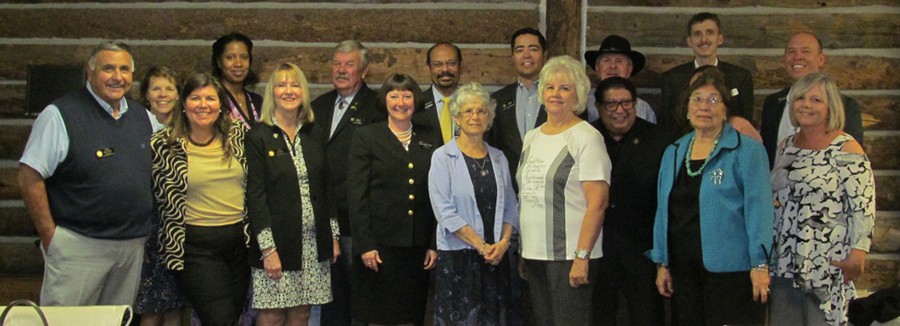CU officials meet with local leaders

ALAMOSA — Collaboration was a significant message during a meeting on Monday with University of Colorado regents and administrators, local health care leaders and state legislators.
In addressing each of the issues that arose during the discussion — from opioid use to training and recruiting health professionals — collaboration and cooperation were key components.
“It’s important for the university and all of us to work together,” said CU Colorado Springs Chancellor Venkat Reddy for whom this was his first trip to the Valley in his new role. “We do hope that some really great things come out of these conversations.”
He and the CU regents accompanying him (Regent Chair Sue Sharkey and 3rd Congressional District Regent Glen Gallegos) shared their desire to work with Valley educational and medical institutions.
In addition to the noon meeting with health professionals and legislators, the CU contingent met earlier in the day with SLV Health Chief Executive Officer Konnie Martin and Adams State University President Dr. Cheryl Lovell.
State Representative Donald Valdez and State Senator Larry Crowder were also in attendance.
CU has long worked through the SLV Area Health Education Center (AHEC) to help young people get into the medical field through programs beginning at the high school level and continuing with higher education institutions, with the hope that some will return to the Valley to work in health care careers here. Some of the students who went through these hands-on training experiences years ago under AHEC Director Al Kelly, who was present for the Monday meeting, are now working in the medical field as nurses, dentists and doctors.
“It’s a good idea to create your own pipeline because of the rural health care shortage,” added his daughter Tanya Mares Kelly-Bowry, vice president of government relations for CU.
UCCS Dean of Education Valerie Martin Conley said CU would like to work with mental health agencies here in a similar fashion to what the medical students are doing here, gaining experience and hands-on training.
“We might be able to work together to help with the opioid crisis,” she added.
AHEC Executive Director Eric Stevens said one of the biggest driving forces in the medical community locally and across the nation has been the opioid epidemic. While it has taken over the country as a whole, “It’s really hit our area,” he said.
He added that in October due to federal funding AHEC would be able to hire navigators who can assist addicts in finding the services they need “and hopefully help them get out of the cycle of addiction.”
AHEC has also conducted education for providers and through the efforts of AHEC’s Charlotte Ledonne has begun a harm reduction program in Alamosa, which regularly assists about 80 clients. “It’s grown exponentially each week,” Stevens said. He added he hoped the program would expand throughout the Valley.
“AHEC has done a wonderful job with the opioid crisis we have in the community,” said Emelin Martinez, chief medical officer for Valley-Wide Health Systems.
The group talked about funds being made available to fight the opioid epidemic. Stevens said, “There’s a lot of work to do around the opioid issue. We hope it starts making a difference, because the problem is still getting worse.”
He said if the overdose death rate was divided into quarters, the San Luis Valley would be in the top quarter of the nation, “so the issue is pretty prevalent.”
Sharkey said, “I don’t understand how in this country with all the money, resources and absolutely brilliant minds that we have not been able to solve this and address this problem.”
Deanna Ulibarri-Crespin, AHEC, laid blame on “big pharm.” She said, “They are not being held responsible.”
She said there are alternatives to opioids that could be something as simple as acupuncture or Tylenol, but they are not being used.
“The information is not getting out there,” she said.
Ledonne said she has become familiar with many of the 80 clients in the harm reduction program, even though they do not take names. “They are telling us, many of them, ‘I want to stop. This is not working for me. I can’t keep using’.” She said staff members help those individuals as much as possible with referrals for treatment and other resources.
Ledonne said she sees it as a person-by-person situation. “We have to reach each individual … I see it on an individual basis.”
Caption: Attending a noon meeting with CU regents in Alamosa on Monday were from left, front row, CU Regent Glen Gallegos, CU VP of Government Relations Tanya Mares Kelly-Bowry, CU Regent Chair Sue Sharkey, UCCS Dean of Education Valerie Martin Conley, Charlotte Ledonne, AHEC, AHEC Board President Helen Lester, Former State Rep. Ed Vigil, Carmen Mares Kelly and Brenda Felmlee, aide for U.S. Rep. Scott Tipton. From left in back are Suzanne DeVore, Valley-Wide Health Systems and AHEC board member, Deanna Ulibarri-Crespin, AHEC, State Sen. Larry Crowder, CU Colorado Springs Chancellor Venkat Reddy, State Rep. Donald Valdez, retired long-time AHEC Director Al Kelly, AHEC Executive Director Eric Stevens and David Sprenger, CU Government Affairs./Courier photo by Ruth Heide



